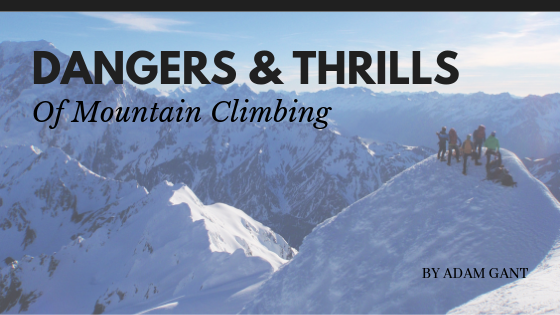Mountaineering provides a number of incredible benefits and opportunities; from the breathtaking sights to the incredible workouts, climbing a mountain is sure to grant you a unique, timeless experience. However, mountain climbing is not for everyone, and there are many risks one must take when climbing a mountain. The activity is certainly dangerous, but those who partake often guarantee that the thrills are worth the risk.
Thrill: Summit
Reaching the highest point of a mountain is an incomparable experience. When climbers reach that peak, they may be tired, but the unprecedented sights and exalted heights are sure to impress. The sensations of freedom, pride, and accomplishment are unparalleled.
Reaching a mountain’s summit provides a 360 degree view from a height that is not reached every day. Mountain climbing is a form of exploration, and making it to the top of a mountain is part of what drives mountaineers to climb. Few people are able to reach these heights and achieve the views visible from mountaintops, and this singular pleasure can be enough to compel people to climb.
Danger: Falling
One of the most common dangers of mountain climbing is, simply, that of falling. Tripping over uneven terrain and slipping on wet ground are common causes. Contrary to what some may believe, the most dangerous part of the climb is often the descent; when exhaustion sets in, loose sediment litters the ground, and a downward path grows too steep, falls are more likely to occur.
Danger: Conditions
An increasing lack of oxygen can cause significant discomfort, difficulties, and even death. The higher the altitude, the less air is available, meaning the task of breathing becomes labored. Many climbers bring bottled oxygen to compensate for their inability to breathe normally. Depending on the individual’s endurance, experience, and health, hypoxia can occur; hypoxia is a dangerous condition that occurs when the body does not have sufficient oxygen, and if the individual were to continue ascending, they would risk dying.
Weather is also a major contributor to climbing accidents. Unpredictable conditions from strong wind gusts to sudden storms can hinder progress and cause harm. Some climbers also fail to be diligent enough when preparing for their expedition, meaning they often do not have the necessary supplies to account for any unforeseen circumstances.
Thrill: Strength
Mountain climbing can be incredibly difficult, but there are reasons why climbers continue searching for new mountains to scale. From improving physical strength to enhancing mental fortitude, climbing mountains provides a host of positive effects that outlast the trek and influence everyday life. Mountain climbing teaches a number of virtues including patience, gratitude, and perseverance. The journey can be challenging, but it is often unbelievably rewarding.
Though there are certainly many dangers that impact the prospect of climbing a mountain, the thrills and benefits that accompany such a task are often worth the challenge.

